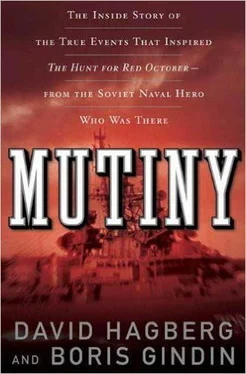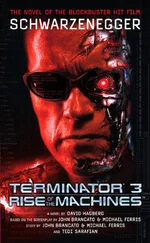“I offer no criticism of the Communist Party or of the October Revolution. Those are pure. But there are men in Moscow who are bringing the Rodina to her knees like a common whore. Your mothers and sisters have been told so many lies that they may have to go begging on the streets. They may have to get down on their hands and knees just to feed their families! To feed you fine boys!”
There is a stirring now among the assembly. Sablin is painting a dramatic, if dreary, picture of what will happen unless they do something about the sickness and corruption that has gripped Moscow.
“The people of Russia—your fathers and your brothers—have no rights! They’re starving while a few old men in the Kremlin drink champagne and eat caviar and blinis.
“Brezhnev and his pals are making fools of you. It is finally up to us, the men in the military, to protect our Motherland from the real enemy, and we must let the people know what we are doing.
“Russia must finally become the democracy that Lenin promised us, or else we will remain a backward country, a poor country with no opportunities.”
The first of the rumbling dissent begins, and Sablin’s heart picks up a pace. He has them now!
“We need new leaders to run the country! Leaders whom the people will elect! Honest men who are patriots, willing to do as we tell them, not as they tell us!”
Sablin is overcome by his own words.
“The Party leaders in Moscow are getting rich off the labors of your fathers and brothers, and the heroic sacrifices of your mothers and sisters. It must end now!”
The murmuring is getting louder. These sailors, most of them twenty or younger, are being moved by the zampolit’s impassioned words.
“I want you to follow me to Kronshtadt, where we will go on television and take this message directly to the people,” Sablin tells the crew.
“I have spoken with honest officers in many military units all across the country who agree with me. They have promised to rise up to support us, if we will only lead the way.”
This is a lie; the only person he’s told about his plans who isn’t aboard the ship at this moment is his wife. But the crew believes him.
“We’ll be lined up and shot!” someone shouts. It’s the same fear that Shein had expressed.
“No one will be shot,” Sablin assures them. “I’m an officer, and I’m giving you men a direct order. No one in the Soviet navy has ever been shot for obeying a direct order.”
“What if we don’t agree?” someone else shouts. “What if we just return to our cubricks? You can’t have a fucking mutiny without us.” The speaker is anonymous in the darkness and in the ranks, so he’s braver than those in the front row.
“That doesn’t matter,” Sablin says. “Because I’ve already told Moscow what we will do. If we don’t get out of here in the morning, the KGB will come aboard and arrest us all. You included. So make up your minds right now.”
No one says a thing.
“I want to know who is with me!” Sablin cries.
He strides directly to the first man in the formation and looks him directly in the eyes. “Are you with me?”
“Yes, Captain Third Rank!” the young man shouts without hesitation.
Sablin steps to the next man. “And you?”
“I agree,” the crewman responds immediately.
The polling of votes goes very quickly. In the end, not one of the crew is against the mutiny.
“You will not regret your decision,” Sablin tells them from the head of the formation. “Officers in all the fleets are standing by for word from us to join the revolt.”
Gindin and the five other officers and three midshipmen who voted against Sablin are locked in a compartment near the bottom of the Storozhevoy that is used as a maintenance depot for the ship’s main sonar stations. For the next couple of hours they are left to their own devices; in fact, they can hear no sounds of any struggle topsides, no shouting, no gunshots. Nor does anyone come to talk to them or threaten them. But that business is inevitable, and they all know it.
“This is a mutiny,” one of the officers says. “And we’re a part of it, whether we like it or not.”
“What are you talking about?” Vinogradov asks. “We’re not part of anything. We voted against Sablin!”
“Yes, but we did nothing to stop him.”
“Didn’t you see the guns? What did you want to happen, that we be shot down like stupid heroes?”
“Well, we’ll probably get our nine ounces in the end,” Vinogradov says. “Doesn’t matter whose gun it comes from, one of Sablin’s cronies from the crew or one of Brehznev’s pretty boys from the KGB.” He pokes a finger toward Gindin. “What do you think, Boris? Will we get out of this one alive? Or maybe this is a test. Just some sick joke that our zampolit has played on us?”
Gindin shakes his head. “This is no joke, and I think we have to find a way to get out of here before Sablin carries it too far.”
“He can’t get the ship out of here and sail to Kronshtadt without us,” Sergey Kuzmin says.
Some of the others are swearing, and a few of them are banging their fists on the metal bulkheads and the door. But they stop suddenly and look across at Sergey. Maybe he has a point and the situation isn’t as desperate as they first thought. If Sablin couldn’t get out of here in the morning when the rest of the fleet was leaving, someone would come over to investigate, and the jig would be up.
“I’m not so sure,” Gindin says. He is remembering the odd conversation he had with Sablin a couple of days ago. The zampolit came down to the engineering spaces and asked all sorts of questions about the engines and their control panels.
“Complicated machinery down here, Boris,” Sablin said. “It must be difficult to teach these boys how to do their jobs.”
“Not so tough,” Gindin replies. He’s proud of his crew. They are good sailors, for the most part, and he’s taught them well.
“They couldn’t be left on their own, if there was an emergency,” Sablin said. He is looking at gauges on the control panel. “Say if you were delayed for some reason, they wouldn’t know what to do. They’d be lost.”
“If it was a big enough emergency and our lives depended on getting under way, they could manage until I could get down here,” Gindin said.
Now, locked in the compartment, he realizes just how shortsighted he’d been.
“What are you talking about?” Vinogradov demands.
Gindin looks at his fellow officers. All of them have stopped their shouting and banging, and they’re all staring at him like he was a man from Mars. “If he has the enlisted crew with him, plus Vladimir and the other officers, he could do it.”
“What, start the engines and sail out of here?” Kuzmin demands.
Gindin has talked with some of the other officers who found Sablin’s behavior over the past few weeks just as odd as he has. The zampolit has been asking a lot of questions.
“I think so,” Gindin says.
“Who’ll navigate for him?” Vinogradov wants to know.
Gindin shakes his head. “He could head down the river, and once out in the open Baltic he just has to follow his nose.”
“So he follows his nose, Boris,” Vinogradov asks. “But to where?”
“Sweden,” Kuzmin breaks the sudden, dark silence.
“My God,” one of the other officers says softly. “The bastards insane. He means to defect. We’re all dead.”
“Not unless we can get out of here first,” Gindin says. “Sablin told us he wasn’t leaving until morning.”
“But there’s only nine of us,” Kuzmin points out. “If he convinced even half the crew to go along with him, there’s nothing we could do aboutit. There’s just too many of them. They wouldn’t even need guns.”
Читать дальше












